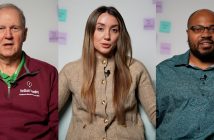Fordham’s Gabelli School of Business recently became the first in the country to offer a course specifically designed to help undergraduate and graduate students pursue the top professional credential in environmental, social, and governance (ESG) reporting.
The new course, titled Sustainability Reporting and SASB Standards, allows students to learn Sustainability Accounting Standards Board (SASB) principles through case studies, data sets, guest speakers, and other resources. The students will be prepared to take the Fundamentals of Sustainability Accounting (FSA) Level 1 certification exam at the end of the course.
“Sustainability disclosures are the future of reporting information,” said Barbara Porco, Ph.D., clinical professor and associate dean of graduate studies at the Gabelli School of Business, who is an instructor for the course. “We’re preparing students for the future.”
Sustainability accounting refers to how a company’s social and environmental impacts are measured, analyzed, and reported. Porco said that interest in sustainability reporting increased exponentially after Larry Fink, the founder, chairman, and CEO of BlackRock, wrote in his annual letter to shareholders in 2018 that companies should state their purpose and how their work contributes to society.
The Ability to Drive Value
The course, created in collaboration with the Value Reporting Foundation, highlights the connection between financial sustainability reporting and a business’s ability to drive value.
SASB standards are considered to be at the forefront of sustainability reporting. Through the course, students learn how sustainability issues can impact a company’s value and how to integrate data on environmental, social, and governance issues into reports, corporate strategy, and investment analysis.
“There is a huge demand for skill sets in the [ESG] area, and I believe our students are going to be uniquely qualified when they get to the marketplace because they have been so deeply engaged with these standards,” said Timothy Hedley, Ph.D., one of the instructors of the course and an Executive in Residence at Fordham University.
‘A New Dialect’
The standards have their roots in the Sustainability Accounting Standards Board, which was founded in 2011 by Jean Rogers, an engineer and former Loeb Fellow at Harvard University, as a way to help businesses and investors develop a common language about the financial impacts of sustainability. The organization merged with the International Integrated Reporting Council to create the Value Reporting Foundation in summer 2021, but its standards still remain. SASB standards aim to help businesses “identify, manage, and communicate financially-material sustainability information to their investors.”
Porco said that sustainable reporting is essential to the future of business.
“I’m in a position where I’m able to give the students not only what they want, but what they need,” she said. “This is the language of business, but it’s a new dialect. And everybody’s got to learn how to speak it and understand it or you’re going to be behind.”
The course–which was first offered last semester–features five graduate students that help lead a class of 15 undergraduate students, according to Porco. She said that she intentionally kept the class size small to help facilitate learning. While the course is listed under accounting, Porco stressed that it’s not a traditional accounting course.
“The course is in sustainability disclosures and SASB standards—there are students in this course who are not accounting majors,” she said.
A Prestigious Certification
The students will also have the opportunity to walk away with a globally recognized certification, although sitting for the certification exam is not required to pass the course.
“They will also be positioned to take the FSA Level 1 exam and Fordham will be sponsoring them to do so. That is a globally recognized certification—there’s only 3,000 people in the world that have FSA Level 1 certification,” she said. “I would think that probably within the next five years that’s going to go into the hundreds of thousands.”
She said that she would love for at least half of the students enrolled to pursue the extra certification.
This curriculum is the latest addition to the Gabelli School’s impressive range of academic offerings on sustainability, including a sustainability reporting track for accounting majors, a sustainability accounting minor, and embedded sustainability content throughout the school’s core courses.
In addition to providing these skills to Fordham students, in February 2022, the Gabelli School launched three new open enrollment programs in ESG literacy for professionals outside of Fordham: an ESG Bootcamp, as well as FSA Level 1 and Level 2 training. All offerings are eligible for Continuing Professional Education credits.
“It’s part of our mission. We not only educate our students holistically, but students need to understand organizations holistically, cura negotium,” she said, using a Latin phrase meaning to “care for the whole of business” which is related to Fordham’s value of cura personalis, or “care for the whole person.”
“[This is knowledge they need] to be the future responsible business leaders.”



